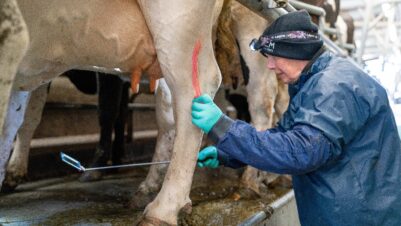The South West TB Farm Advisory Service (SWTBFAS), a service funded through the Rural Development Programme for England (RDPE) and hosted by the National Farmers Union (NFU), was set up in 2010 to help farmers protect their livestock from bTB. Funding ended in June 2015 though the phone number is still active and support to farmers is provided from the NFU office. The SWTBFAS team believes the service has been very effective in supporting farmers and has applied for further funding for a national service from the next round of RDPE funding. SWTBFAS Lead Advisor Sophie Jones summarises its work to date:
The South West is the largest region in the UK with 74% of the land engaged in agricultural – predominantly livestock farming – use. It is a powerhouse in the country’s livestock sector as the base for more than 1.7 million cattle – a third of the English herd. Unfortunately, it also harbours bTB in both its cattle and badgers.
In 2010, more than 3,870 herds were under restriction at any one time in the region and stakeholders recognised that providing support, advice and training for farmers would be critical to manage the disease, both in terms of animal health and business viability. In response, the NFU developed the South West TB Farm Advisory Service with support from wider industry partners and secured funding for an initial period of four years.
Since its launch in 2010, the service has offered free and confidential advice to livestock farmers in the South West, giving them one to one guidance and support via our team of TB Advisors, all of whom received training by APHA Veterinary Officers (VO’s) among other experts, on relevant TB-related issues.
We have also worked in partnership with the South West Healthy Livestock Initiative to educate farming and veterinary audiences about bTB. This was particularly important at the outset when many felt there was nothing they could do about the disease, given its complexity.
The support provided to farmers included giving advice on the rules and regulations around bTB restrictions, trading and movement options and assisting with farm casework in liaison with APHA. We also helped farmers to understand how and where their cattle were coming into contact with badgers, through the use of badger surveys and cctv cameras, encouraging them to take simple but effective measures such as fencing off setts and latrines, raising feed and drinking troughs or making buildings more secure.
The role of Official Veterinarians (OVs) was of course very important and we have worked closely with many of them in private practice to deliver the service, by providing extra support to their clients struggling with the everyday problems being shut down with bTB brings. We have provided speakers at evening meetings on biosecurity and attended around-the-table with affected farmers, together with their OV.
By June 2014 we had carried out more than 1,150 farm visits with more than 500 sett surveys, handled more than 1,400 individual farm enquiries, attended more than 300 farm meetings and held in excess of 70 bespoke events.
While we have provided much needed help at an individual farm level, we believe the success of the SWTBFAS should also be judged at a macro level. Our introduction of the use of video footage, combined with walking or showing farmers aspects of their farms, has helped to show them the full picture of activity and this has had a significant impact in terms of creating a positive response to our recommendations among farmers and in building support for the business case of managing on-farm biosecurity. Most farmers have been appreciative of the efforts being taken to tackle the problem.
By sharing knowledge, case studies and best practice about disease risk, we have also helped to protect farm businesses and encouraged herd health planning – a vital tool for the cattle industry in the region. Finally, we have collaborated with stakeholders to drive real and positive change on farms and, at the time that our current funding ended, the level of enquiries from farmers in the region was at an all-time high.
Of course, the battle against bTB was always going to be a long one. Given its continuing geographic spread, the value of our cattle industry to the economy, the landscape and the food chain and the benefit we feel SWTBFAS has provided in the South West, the logical next step is the development of a national bTB support service and we are committed to deliver this and have submitted an application for funding.
Our partners and those who have used the SWTBFAS service agree that one of the reasons it has been so successful is the lack of a ‘cost barrier’. If our recommendation for a national service is adopted, we hope it can remain free as we believe the introduction of charges would be a barrier for many that would limit its reach and success. It is not that farmers are unwilling to invest – those we have worked with in the South West have invested significantly in biosecurity and in reducing risk on farm – it is more that the investment they are required to make should be targeted effectively.
We will also work to continue the successful collaboration we have enjoyed on complementary bTB programmes with APHA, Defra and the OV community. SWTBFAS brings with it valuable existing expertise and direct farmer contact which will help to ensure positive outcomes for farm businesses. Our relationship with OVs is particularly important to the success of the service. They play a part in training our TB Advisors, give advice to farmers when required and also speak at many of the farmer biosecurity meeting we hold. We are grateful for their support so far and hope soon to be working with them at a national level.
- For further information on the SWTBFAS, visit: http://www.southwest-tbadvice….






